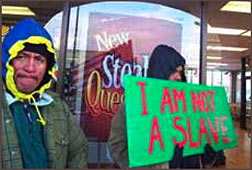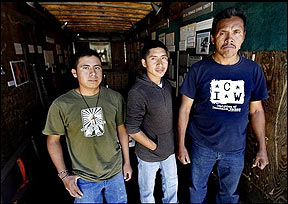Plus… Pics don’t lie: Supermarket giant Ahold on the hook for buying tomatoes from grower that used enslaved workers from Navarrete prosecution…
The Modern-Day Slavery Museum wrapped up two days in Tallahassee yesterday before heading south to Gainesville, where it will spend the rest of the week in and around the campus of the University of Florida. Before leaving Tallahassee, however, the museum got some nice coverage in the capital city press, including a story in the Tallahassee Democrat (“Modern-day slavery on display,” 3/17/09, photo above by Glenn Beil/Tallahassee Democrat). Here’s an excerpt:
| “Sometimes a produce truck is more than a basic work vehicle. On some occasions, it can become a prison.
That was the case in November 2007, when four migrant workers in Immokalee found themselves locked in the back of a produce truck on Thanksgiving Day. One of them had been chained to a side panel in the truck, but another was able to punch a hole in the roof and escape… Their plight led to the successful prosecution of growers Cesar and Geovanni Navarrette, who pleaded guilty in 2008 of holding workers in involuntary servitude. A similar produce truck — called a Florida Modern-Day Slavery Museum — was on display Tuesday at Florida State University’s Center for the Advancement of Human Rights…” read more |
Also check out this great article from the FSU student newspaper, FSU News, entitled, “Touring museum exposes abuse: Historic and modern-day slavery examined in exhibition” (3/18/10).
Thanks go out to our friends at the Florida State University’s Center for the Advancement of Human Rights, one of the museum’s lead endorsers, who kindly provided space for the museum to set up and helped get the word out to the community about the stop.
 And speaking of slavery…
And speaking of slavery…
Amsterdam-based supermarket leader Ahold (owner of two of this country’s best-known grocery chains, Giant and Stop and Shop) has a situation on its hands.
With its annual shareholders meeting just around the corner — and growing shareholder awareness of Ahold’s refusal to work with the CIW sure to make itself an issue at the meeting — news comes in the form of fresh photographic evidence that Ahold continues to purchase tomatoes from Six L’s, one of the growers that used the enslaved workers from the Navarrete case to pick tomatoes.
The picture above was taken yesterday at a Giant store in Plymouth Meeting, PA. Representatives of the CIW were in the area thanks to Villanova University, which recognized the CIW with its 2010 Adela Dwyer-St. Thomas of Villanova Peace Award. As part of the national Supermarket Week of Action, a delegation of local Fair Food activists and the CIW representatives visited the Giant store and found Six L’s brand “Cherry Berries” tomatoes prominently displayed in the produce section. They even bought a couple of boxes to share the news with the audience at the award presentation later that day at Villanova.
The picture graphically underscores one of the most vexing truths of this country’s food industry unearthed by the Campaign for Fair Food: The vast majority of retail food companies are astonishingly unwilling to change suppliers, even when those suppliers are found to be using slave labor.
 It doesn’t matter what they say to the public about social responsibility — virtually every company has a “zero tolerance” policy for forced labor — retail food companies are, with very few exceptions, hypocritcal in their purchasing practices and resistant to change even when presented with indisputable factual evidence of abuse in their suppliers’ fields. That’s not an attack, it’s just a fact.
It doesn’t matter what they say to the public about social responsibility — virtually every company has a “zero tolerance” policy for forced labor — retail food companies are, with very few exceptions, hypocritcal in their purchasing practices and resistant to change even when presented with indisputable factual evidence of abuse in their suppliers’ fields. That’s not an attack, it’s just a fact.
Ahold, it seems, is no exception. But it’s one thing for a company like Publix to take a stand against consumers who are calling for it to cut off purchases from growers tainted by slavery. The market for sustainable food is still in its infancy in this country and consumers are just now learning about the human rights violations that are so commonplace behind the fruits and vegetable they eat.
But Europe is a different story. In the Netherlands where Ahold’s headquarters is located, the demand for social responsibility and the market for fair trade products are well-established and growing. Ahold will have to answer for its purchasing practices to a different audience at its upcoming shareholder meeting, and stonewalling its consumers on slavery won’t be an option. If Ahold doesn’t make a change soon, things should be even more interesting than usual in Amsterdam this coming April. Stay tuned…

